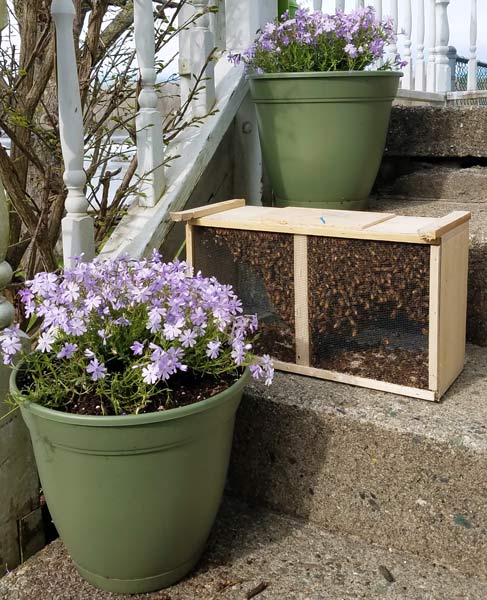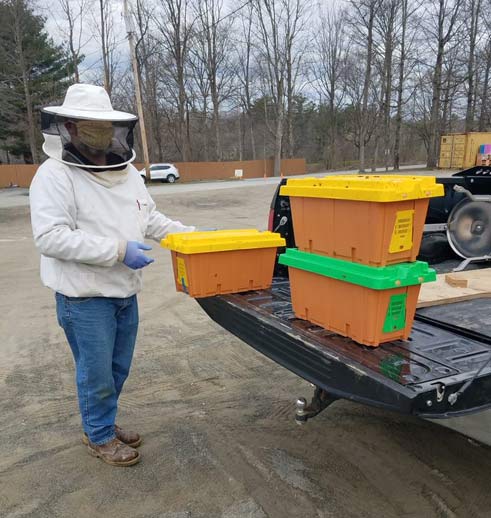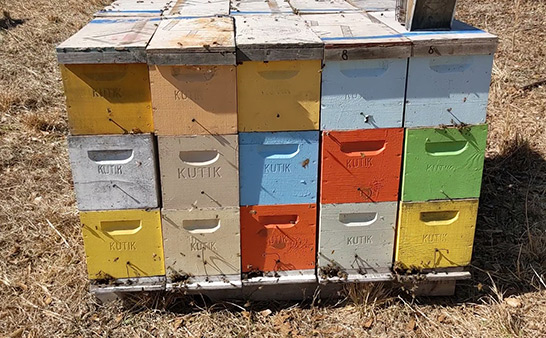After you’ve done the research and prepared your bee yard, the next step is ordering your honey bees — but where do beginning beekeepers get their first bees? Explore this part of our beekeeping guide to learn how to order bees, the differences between a package and nuc (and which is the better option for you), and what happens if you only need to purchase a queen.
Nuc versus package bees: Which is better?
When purchasing bees, the two main options are package bees or a nucleus hive, also called a “nuc” (pronounced like “nuke”). There are pros and cons to each, and either can be a good choice for a beginner. To decide which is better for your purposes, consider these details.
What is a bee package?
Package bees simulate how bees in the wild start a new colony: by sending out a queen with a swarm of workers. A package of honey bees contains approximately three pounds of workers, as well as a young, new queen who is tucked away in a protective cage amongst the workers. It typically also contains a can of sugar syrup to keep the bees fed while they are in transit. Betterbee’s bee packages come from Georgia and are transported by truck to our location in Greenwich, New York shortly after packaging.
Package bees are cheaper, and the installation window for a package of bees is flexible.
Because you’re adding your bees to your hive, rather than installing a nuc that includes honeycomb, you’re less likely to introduce brood diseases via a package. However, package bees must start growing from scratch — there’s no comb, honey, or brood included.
What is a bee nuc?
A nuc is a miniature — but fully established — colony of bees. A nuc includes a mated, laying queen, and five frames of drawn comb filled with brood, honey, and pollen. Because the nuc already includes the comb and food resources, your bees get a great head start. You're likely to get deep frames, rather than medium frames — ensure you’ve got a deep box and some additional deep frames waiting for your nuc to move into.
There are two types of nucleus colonies: spring and overwintered. Spring nucs are created by dividing existing colonies in spring, while overwintered nucs were split the previous summer and have successfully survived a winter together. An overwintered nuc may be ideal if you live in a cold climate, as the bees will have had a chance to grow accustomed to lower temperatures and snowy seasons and the queen will have thoroughly proven herself by having laid eggs for months during the previous summer and fall.
Nucs may be more stable and grow faster than packages. The bees are already used to the queen, which means there’s less risk of something going wrong — for example, if the package queen gets out of her cage before the bees have accepted her she can be harmed or killed. However, nucs can be more expensive than packages and have the potential to transport brood diseases via existing combs — especially if purchased from an unsanitary or unscrupulous beekeeper.
What happens after you order your bees?
If you order your bees from Betterbee, we will contact you to schedule pick up when the bees are ready. We schedule pick-up appointments in April and May, depending on weather and bee availability. Many beekeeping suppliers follow a similar procedure, while a few may ship bees directly to you.
After you’ve ordered your bees, spend some time perusing beekeeping books and resources and prepare your hives for installation day. Get used to using your smoker and other equipment. Put on your bee suit or jacket and gloves and practice moving and gripping until you’re comfortable wearing your protective clothing. Consider signing up for an online or in-person beekeeping class. Order any additional beekeeping supplies you forgot — we can have them ready for bee pick-up day, or ship your order to you ahead of time.

Bee package

Bee nucs
How often do you need to order bees?
Generally, a strong, active colony will continue to grow and thrive without ordering more bees. The main reasons and circumstances that will require you to purchase new honey bees include:
- New beekeepers must purchase bees after setting up their first hive — the bees won’t come to you. While beelining is a fun hobby that allows you to track feral bees and pinpoint the location of a colony, and while experienced beekeepers can capture a swarm of bees and bring them home, these methods are not recommended for beginners populating their own hives. For beginning beekeepers, either a package or nuc is ideal.
- Replacement packages may be necessary if your colony dies over the winter due to the elements.
- Health-related loss also requires replacement packages. Diagnose the reason for hive death to identify your next steps: if pesticide build-up, bacteria, or disease is the culprit, reusing the brood comb, honey, or equipment may be unsafe for future colonies. Combs can be reused if parasites or other pests are responsible for your colony’s demise.
- If bees have absconded — the term for when the entire colony abandons the hive — you’ll need to perform a bit of hive maintenance before installing new bees. Scrape out any debris, such as damaged combs and dead bees, and your new bees will do the rest.
- Simply adding a queen alone will not be enough to populate your hive, but requeening — the process of replacing the queen in an existing colony — may be necessary if your existing queen has become less productive, if your queen has died, or as a disease-prevention tactic.
- Our favorite reason for ordering bees is to increase the number of hives you're keeping so that you can make even more honey and wax each year!
How to buy bees for your hive
The most common methods for buying bees include ordering online, over the phone, or in person at your local beekeeping supply location. Betterbee offers online ordering. We do not ship bees; our nucs and packages are available for scheduled springtime pick up only. This is beneficial for the bees: Picking up bees, rather than shipping them, reduces stress for a better survival rate. Even if you order your bees elsewhere, we won’t mind: You can still rely on Betterbee for beekeeping supplies, equipment, and educational materials.
When to order bee packages or nucs
Though you’ll install bees in spring, buying bee nucs or packages happens early — in many locations ordering happens during winter. In busy areas with high demand, ordering may begin even earlier. Do your research, get your order in, and revel in the excitement until pick-up day.
To order bees from Betterbee:
- Order early! Plan to place your order in late fall or early winter. We often sell out by the end of February.
- Place a standalone order for your bees to help us stay organized. Select "Pickup at Betterbee" during checkout. We will contact you closer to the delivery date to schedule your pick-up day.
- Place a separate order for any supplies or equipment. We can ship these items, or you can collect your order with your bees — select the same options during checkout and we will prepare your merchandise for your selected pick-up day.
Do you need to order a queen bee?
Queens cannot create a new colony alone: You’ll need a nuc or bee package to start a colony, both of which include a queen. However, there are some circumstances where you may need to order a queen, rather than a nuc or package.
A queen bee can live and continue to lay eggs for five years or more before she must be replaced, though most queens start to fade within just a couple of years. When the queen dies, the surviving worker bees begin the natural process of re-queening the colony: Worker bees cultivate a new queen from female larvae who would ordinarily become workers. You may need to requeen to solve brood disease problems, to reduce defensive behaviors in the hive, or in case of laying issues. While a swarm always leaves half of a colony behind, requeening may be necessary.
The ordering window for queens is much more flexible than with nucs or packages. We accept orders for queen bees on a rolling basis throughout the spring and summer, with overnight shipping available to locations within the United States. All equipment or supplies must be shipped separately, so please place separate orders for your queen and merchandise.
When buying bees, plan ahead so you can place your order before packages or nucs run out, ensure you’ve got your beekeeping equipment ready to go, then count down the weeks until pick-up day. It’s all part of the beekeeper experience! Explore the rest of our Beginner’s Beekeeping Guide for more on installing bees, hive maintenance, and all-things-honey-bee.



